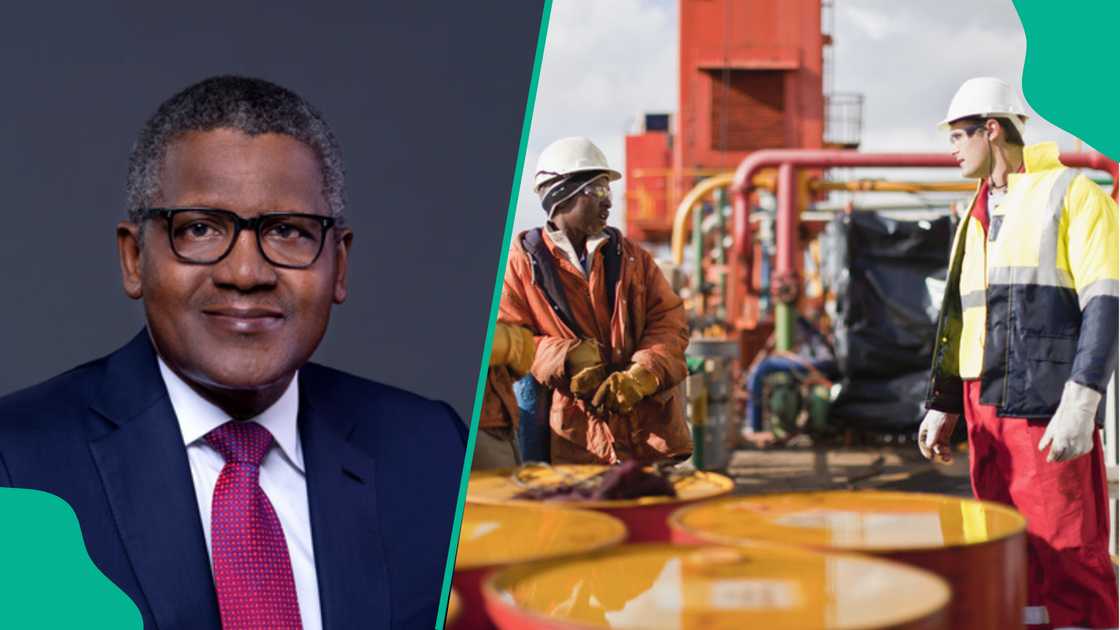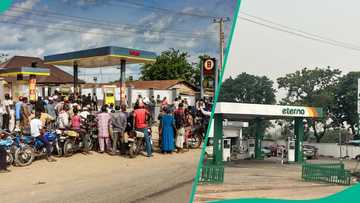Dangote to The Rescue as Port Harcourt, Warri Refineries Fail to Deliver Months After Repair
- Nigerian fuel traders continue to struggle to obtain gasoline from the state-owned Port Harcourt and Warri refineries, forcing reliance on imports and Dangote Refinery
- Nigeria spent ₦15.4 trillion ($9.63 billion) on petrol imports in 2024, more than double the previous year, highlighting its heavy dependence on foreign fuel
- Authorities hope that fully operational local refineries will reduce import costs and improve fuel supply stability
Legit.ng journalist Zainab Iwayemi has 5-year-experience covering the Economy, Technology, and Capital Market.
Nigerian fuel traders say they are having trouble getting petrol from the state-owned Port Harcourt and Warri refineries, although these plants were declared ready six months ago.

Source: Getty Images
As a result, they remain dependent on imports and the privately owned $20 billion Dangote Refinery to meet supply needs, according to a report from Reuters.
While fuel shortages have long been a problem in Nigeria, the nation has spent more than N11.35 trillion ($25 billion) over the last ten years in an attempt to repair its three outdated, non-operational refineries.

Read also
Pressure mounts on Dangote Refinery as four depot owners slash petrol prices below its rate
To lessen its reliance on imported petroleum, Nigeria has invested over $2.4 billion since 2021 to upgrade two refineries in the Niger Delta. However, the local fuel supply is still facing issues due to delays in getting these refineries fully operational.
Fuel dealers claim they are still unable to obtain fuel from the state-owned, NNPC-operated Port Harcourt refinery and the Warri refinery, despite Nigeria declaring the first phase of renovations at these refineries finished in December 2024.
More imports
Over 6,700 fuel stations are represented by the Petroleum Products Retail Outlets Owners Association of Nigeria (PETROAN), which claims that its members remain dependent on fuel imports and supplies from the largest refinery in Africa, the Dangote Refinery.
The Dangote Refinery produces 650,000 barrels per day but has not yet reached its full production capacity.

Source: Getty Images
According to official records, the Port Harcourt refinery, once the biggest in Nigeria, stopped producing gasoline by March 2025.
Nigeria's excessive reliance on imports remains a major concern. According to the National Bureau of Statistics (NBS), the country spent N15.4 trillion ($9.63 billion) on petrol imports in 2024, more than double the N7.51 trillion spent in 2023.
In contrast, the Dangote Refinery produced 20.6 million litres of petrol that month, while imports contributed 25.19 million litres, together meeting 92% of Nigeria's daily gasoline demand of 50 million litres. Authorities hope that establishing local refineries will drastically cut this expense.
8 Nigerian companies import 332m litres of petrol
Legit.ng reported that eight domestic oil companies have imported a massive 332.4 million litres of petrol between May 11 and 16, 2025. This is according to data from the latest Tanker Position Report.
The total volume, equivalent to 277,000 metric tonnes (MT), was discharged or scheduled for discharge at key coastal depots in Lagos, Warri, and Calabar.
The development comes amid increasing competition in the downstream market, where Dangote Refinery is expected to begin full-scale retail operations soon.
Source: Legit.ng


